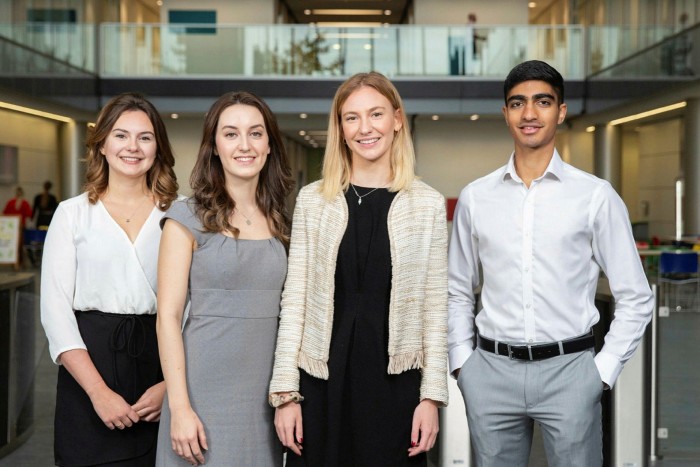Clients are going digital, and so must the lawyers

Simply sign up to the Professional services myFT Digest -- delivered directly to your inbox.
The common critique that law firms are no match for the digital economy is not borne out in the FT Top 30, a selection of the most innovative law firms in Europe.
This is particularly true for the top 15 law firms, which have embraced digital transformation both for themselves and their clients. Some are pacesetters, some are sprinters and some are stalwarts (see below).
They are also trying to change their culture, which is easier said than done for established law firms generally known for being hierarchical and risk-averse. Yet many firms proved ready to cope with the effects of the pandemic. Famous for presenteeism they switched to working remotely and adopted new working practices fast — sometimes literally overnight.
Most European law firms now have what they often call “advanced” teams, which assemble the skills of legal engineers along with technologists, project managers and design thinkers.
Five years ago, the firms that had them did not use them fully. Today, they are called on extensively, at least in the top firms, and have become standalone, fee-earning units.
At the same time, new roles are emerging for lawyers; business professionals are rewarded with equity; and the notion of what it means to be a pure, advisory lawyer has changed.
None of the firms can be called truly digital but some, such as Hogan Lovells, are making significant strides in using technology to gather and analyse data in order to guide how they operate. Others, such as Pinsent Masons, are using technology in their strategies for winning new business — rather than relying on an established relationship between firm and client. Many areas of legal practice now employ lawyers who are adept at tech: their clients are going digital and so must they.
Most of the top firms say they are committed to an environmental, social and governance (ESG) agenda. Many pledge to become carbon neutral by 2024, and many are acting to improve diversity in a deeply homogenous profession.
Which law firm was deemed most innovative of all for the awards that accompany this report? The different ways in which law firms innovate, outlined right, can make it tough to compare. After 15 years of the Innovative Lawyers reports, it is plain that innovation is enabling the law firms to differentiate themselves from each other.
Ultimately, however, Pinsent Masons stood out in the vanguard of being multidisciplinary, and also putting purpose at the centre of its strategy. It has long been talking the talk of innovation; now it is a firm most clearly putting that into action.
Read below for the FT Top 30 - the pacesetters, sprinters and stalwarts. Plus: the methodology for the ranking and listing.
Note: 1-15 are ranked; 16-30 are listed alphabetically
Pacesetters — FT Top 30: 1-7

WINNER: Pinsent Masons
This is one of the few law firms to say outright that to be composed mainly of expert lawyers is not sustainable for the 21st century. With its mission to become a “professional business with law at its core”, Pinsent Masons continues to expand its capabilities and to redefine its culture.
Its “advanced delivery team”, initially set up to service the firm’s financial services practice, has now expanded to real estate and energy. This unit works directly with clients on tech-based solutions to problems, has doubled in size in the past year and has its own profit and loss account. The tech-based approach to legal work is reflected across the firm. Lawyers in the clean energy team, for example, are fluent in working with blockchain technologies when advising the energy industry on enabling consumers to buy, sell and store electricity.
The firm’s culture is also evolving: senior associates contribute on strategic decisions, and even the website is now an important generator of new business.
In brief: it takes more than lawyers to make a law firm
Hogan Lovells
Under Susan Bright, regional managing partner since 2013, the firm has instituted innovation across the business, from delivery of legal services to building a responsible business.
It is one of only a few firms that were early users of data science to analyse and improve client relationships. Efforts to pull collective knowledge into a central system come to fruition this year under Katya Ullrich-North, global head of knowledge. Hogan Lovells launched a flexible lawyering programme and trialled new ways of working, including moving business roles out of London.
The firm has increased the use of its own data and tech, including developing a machine learning tool in Korean.
In brief: experiments pay off
Allen & Overy
The firm continues to push the boundaries of both business and practice innovation, steered by senior partner Wim Dejonghe, a leader at the firm in various capacities since 2008.
Pushing A&O’s innovation agenda are younger lawyers such as Nitish Upadhyaya, who leads the i2 ideas and investment team. After a break from law to work at an international charity, Mr Upadhyaya has engaged staff globally in generating ideas to improve the firm. Senior associate Tom McGuffie blends the roles of lawyer and developer in his work to help financial institutions.
Meanwhile, the firm has diversified with the formation of A&O Consulting, a regulatory consultancy business.
In brief: blended skills
Freshfields Bruckhaus Deringer
One of the first to appoint a chief digital and technology officer, in 2018, the firm is implementing its digital strategy through Hub, a unit that supports the firm’s legal practices with tech, people and processes to provide digital training for all staff.
Staff training on digital transformation at clients resulted in more invitations to pitch on tech-related mandates, while the Vienna office has experimented with going completely digital.
The firm helps clients embrace the environmental, social and governance agenda via its business and human rights group and its financing team. The latter used a digitalised consortium process to advise on loans linked to ESG ratings for global machinery maker Dürr.
In brief: hub, with spokes
Linklaters
Across the board, including its core practice of mergers and acquisitions, the firm has developed new roles in the practice, design and business of law. For example, Greg Baker, a lawyer with extensive transactional experience, now works as a legal engineer using tech across the M&A practice. Lawyers such as Christian Storck in Germany, global co-head of innovation, were early adopters of artificial intelligence, blockchain and smart contracts.
To help recruit a different cadre of legal talent, Linklaters set up a virtual internship programme that enables students from any discipline, university or background to experience pitching, billing clients and structuring a deal.
In brief: law by design
Addleshaw Goddard
This firm is a prime example of how business professionals and non-practising lawyer teams can drive change in law firms. The consulting arm, set up 15 years ago, continues to innovate in its work with general counsel, such as leadership training via its GC Readiness Programme. Its first client is Network Rail, with which it is working on another training project, the O Shaped Lawyer.
In the last financial year, the innovation and legal technology unit worked directly with three quarters of the firm’s clients.
In brief: client-shaped
DWF
After its public listing last year, the insurance law firm has developed its products and services. It acquired Mindcrest, a legal services company, to take its 40-strong managed services business up to 500 people. Another division, which offers non-legal work to clients, generates nearly £20m in revenues. It has increased automation and launched new online training for clients.
Despite the leadership change this year, when chairman Nigel Knowles took over the chief executive role from Andrew Leaitherland, the firm reported an increase in revenues in the first quarter of the new financial year.
In brief: business models converge
Sprinters — Top 30: 8-15
Ashurst
The firm’s “new law” group has worked on 4,000-plus matters for more than 400 clients, while another team offers legal staff on a flexible basis. The units, dubbed Advance teams, have boosted the firm’s ability to support clients in the digital economy, including recent work for Facebook to provide better internet access in Africa.
In brief: advancing into digital
Kennedys
The insurance law firm has developed products such as a tool to allow clients to manage litigation proceedings themselves. This year, it created a separate company, Kennedys IQ, with a dedicated R&D team and an annual budget of £2.5m to continue their development. In one instance its data analysis saved a client more than £20m.
In brief: ‘productising’ the law
Baker McKenzie
The firm continues to explore ways to improve clients’ experiences with initiatives such as innovation fellows, in which managing associates join specific client projects. A special unit has helped clients with legal and business advice for different phases of the Covid-19 crisis. The innovation hub in Germany and alternative legal services teams in Belfast act as test centres for tech solutions for clients.
In brief: enhanced client experience
White & Case

The global firm has retained local market flavours in its innovation projects, which include events, training, education and hackathons.
The business and human rights group was set up in 2018: one of its pro bono projects was to advise the International Council on Mining and Metals on new safety policies after Vale’s Brumadinho tailings dam collapse (pictured above) in Brazil.
In brief: global innovator
DLA Piper
The firm has set out to make radical change so it can offer more than legal advice and compete with the Big Four accountancy firms. A 13-strong change council and team of 70 develop new ideas.
Data scientists, working with Imperial Business School, are analysing old projects to improve processes and move away from the billable hour. In addition, robotic process automation has reduced the time to manage trademark registrations by 95 per cent.
In brief: radical strategy change
CMS
The firm is transforming itself vis-à-vis the environment, diversity and inclusion, and technology. It set a target of net zero carbon emissions by 2025 and created an app for employees to assess their carbon footprint. Anyone can take up to four weeks unpaid leave, and women now make up 32 per cent of the partnership, one of the highest ratios at a top law firm in the UK.
In brief: consolidating a new identity
Slaughter and May
The firm is improving its digital literacy with technical and soft skills training for all staff. Lawyers, regardless of practice area, participate in legal process design workshops and the firm has launched a legal tech incubator programme. The firm continues to advise on high-profile mandates such as helping the UK Treasury’s legal advisers with the provision of Covid funding to businesses.
In brief: growing digital literacy
Norton Rose Fulbright
One of the first to focus on industry sectors in the early 2000s, the firm features in the top 20 of the Innovative Lawyers firms for the first time in almost a decade.
NRF Transform, its innovation group, helps lawyers build tools to support clients with challenges such as the transition from Libor.
The firm launched a business and legal operations graduate scheme in 2019 which focuses on project management, technology, and data science and has advised other law firms on similar projects.
In brief: fast moderniser

Stalwarts — Top 30: 16-30

Most of the law firms in this third tranche are notable for having well established multidisciplinary teams created to encourage change, innovation and use of technology — internally and for clients.
Firms such as Eversheds Sutherland show their commitment to these “digital law” teams by having a partner lead them; others, such as Macfarlanes or Mills & Reeve, do so by setting up graduate training schemes, reflecting the growth of alternative but valued career paths for “non-lawyers”.
This shift, well under way in the UK, is now gaining traction in the rest of Europe.
Garrigues (pictured above), the winning firm for mainland Europe in the 2020 FT Innovative Lawyer awards, has even automated its pro bono work. Others such as Aequo in Ukraine make it a strategic aim to stay ahead of clients’ tech needs, while Cuatrecasas allows clients to pay it in blockchain tokens.
Even in the very traditional Italian market, the largest firm, BonelliErede, is using digital appraisals, training lawyers in project management and moving away from the hourly rate.
The improved quality of training across all the firms is significant. Some choose to partner academic institutions — such as Morais Leitão with Nova School of Business & Economics — while others look to internal teams.
All the firms have intensified their efforts on diversity and inclusion as well as sustainability. NautaDutilh set up a “soft law” practice to advise clients on sustainable business and climate change and allows paid time off for staff to work on a socially responsible project.
Overall, these “stalwarts” underline changes well under way in the legal profession in Europe. (Firms listed alphabetically after Winner
WINNER: Garrigues (Spain)
Aequo (Ukraine)
Bird & Bird (International)
BonelliErede (Italy)
Cuatrecasas (Spain)
Eversheds Sutherland (International)
Gómez-Acebo & Pombo (Spain)
Herbert Smith Freehills (International)
Macfarlanes (UK)
Mills & Reeve (UK)
Morais Leitão, Galvão Teles, Soares da Silva & Associados (Portugal)
NautaDutilh (Netherlands)
Paul Hastings (International)
VdA (Portugal)
Womble Bond Dickinson (UK)
Methodology
2020 marks the 15th year that the Financial Times has published its special report on innovation in the European legal industry. It also marks an unprecedented year of change for the industry, propelled by Covid-19 and the Black Lives Matter movement.
This unusual year also drove the FT and its long-term research partner, RSG Consulting, to take a new approach to the research, rankings and editorial in the report: we focused less on category rankings and individual awards to dissect ever more closely the big trends that are changing the industry.
Law firms and in-house legal departments were invited to make submissions, which were supplemented by separate surveys covering: the future of work, as well as evolutions in the practice of law and how lawyers are using data and technology.
We received 664 submissions and nominations from 115 law firms and 52
in-house legal teams. RSG researchers assessed the submissions and interviewed clients, senior lawyers, executives and experts between June and September 2020.
Entries were scored out of 10 on originality, leadership and impact for a maximum score of 30. This year, scores for each individual entry have not been shown in the report and include an additional indicator for inclusion alongside results from the individual surveys.
Most innovative law firms in Europe 2020
The 30 firms were selected and ranked based on an aggregate of each law firm’s five highest scoring entries in all categories of the report (even if they are not shown in the report), plus scores for the firm’s use of technology and data based on separate information provided by the firm. Law firm entries were read holistically and assessed for the way in which they reflected a firm’s overall approach to innovation.
Most innovative in-house legal teams in Europe 2020
The list of 10 is a selection based on each in-house legal team’s performance in the report and is based on the sum of scores for all submissions to the report by in-house legal teams.
Diversity in law firms
All law firms that submitted to the report received a survey on their efforts to tackle racism internally and in the wider community. The 10 firms were selected for taking active steps to accelerate greater ethnic diversity in law.
RSG Consulting
The research team has decades of experience analysing the legal profession. It has a record of devising ranking methodologies for professional services firms. The RSG researchers on this report were: Reena SenGupta, Yasmin Lambert, Kate Barlow, Georgie Lyon, Mary Ormerod and Tom Saunders.
Comments